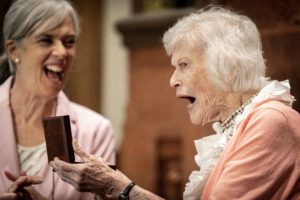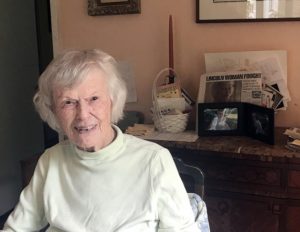
Patricia Warner reacts in surprise as she gets her medal on Memorial Day in Lincoln from Rep. Katherine Clark (left). (Photo courtesy Rep. Katherine Clark’s office)
By Alice Waugh
America recently observed the 75th anniversary of D-Day, but 98-year-old Lincoln resident Patricia Warner was serving the country as a wartime spy years before the invasion — and she was finally recognized for her efforts in May with a Congressional Gold Medal.
Warner had been married for only a few months when she learned that her husband, Robert Fowler, was killed in action at Guadalcanal while serving on the U.S.S. Duncan. Out of a sense of duty but also seeking a measure of revenge, the newly widowed Warner left her infant son (who never met his father) in the care of his grandparents and signed up with the Office of Strategic Services (OSS), the precursor to the CIA. She traveled for two years as a spy during World War II, working in New York, Washington, London, and Madrid.
“I was devastated, of course, and I wanted to help the war effort as best I could,” Warner said in an interview with the Lincoln Squirrel. “As a widow, nobody seemed to want to take me on in America, so I went over on a troop ship to London.”
Although she was listed as a secretary in Spain, her real job was to communicate with the French underground to get downed American pilots out of the Nazi-occupied territories while also socializing and gathering intelligence from Nazi sympathizers in Franco’s Spain, which was neutral in the war.
“I’d be sent to watch people they thought were very iffy and giving secrets to the Germans,” said Warner, adding that she didn’t speak Spanish when she began. “I found out the flamenco dancers were all involved in German activities, so I signed up for flamenco lessons.”
“She was really beautiful. She could go to a cocktail party and get the ear of some high-ranking diplomat as well as staying in contact with those behind enemy lines,” her son Chris Warner said. “But she didn’t really talk about it that much — I just got impressions of going to bullfights and flamenco dancing. We got the romantic side of things.”
The only real danger Warner faced was not from the Germans, but from a black widow spider that bit her. She had to be hospitalized, but her fellow Americans made sure she didn’t suffer alone. “They thought if I were incoherent, there was no telling what I might reveal, so my friends asked if they could be with me in the hospital in case I said anything that I shouldn’t and give away any secrets,” she said.
OSS “mercy missions” at the end of World War II saved the lives of thousands of Allied prisoners of war. At its peak in late 1944, the agency employed almost 13,000 men and women; today, fewer than 100 are still living.
In December 2016, the OSS was collectively honored with a Congressional Gold Medal, the highest civilian award in the United States (along with the Presidential Medal of Freedom), but Warner was unaware that she was eligible for the award. With the help of her son Chris, Rep. Katherine Clark’s office secured the award and surprised her with her own medal as she was surrounded by her family and friends during Lincoln’s Memorial Day observance in May.
Post-war career
After the war, Warner returned to New York and earned a B.A. from Barnard College in international relations in 1949. She was awarded a Fulbright Scholarship in 1951 but turned it down to marry Charles Warner, a history professor, with whom she had five more children. Her daughter Cecily was diagnosed with anorexia around the time the family moved to Lincoln in 1972 and endured years of involuntary hospitalization and forced feedings.

Patricia Warner in her Todd Pond Road home. Behind her is Boston Herald article about her medal. (Photo by Alice Waugh)
Warner immersed herself in the issue, founding Anorexia Bulimia Care in 1978 (later the National Eating Disorders Association), which was named one of George H.W. Bush’s Thousand Points of Light in 1991. She later earned a master’s degree in independent studies (specializing in eating disorders) from Lesley College in 1985 at the age of 64. Just two years ago, Warner published Will You Love Me When I’m Fat?, an autobiography focusing on her family’s struggles with Cecily’s anorexia.
During her varied career, Warner was also involved in the civil rights movement, taking part in one of the Selma-to-Montgomery marches, and was a painter and board member of the Institute of Contemporary Art in Boston.
Warner’s 1939 high school yearbook entry was prescient, noting that her goal was to be a spy or the first female director of the FBI but that she was more likely to be a diarist like Samuel Pepys. In her recent book, she’s modest about her war exploits. “I like to think of myself in the OSS, skulking around darkened bars draped in mascara and allure, dropping truth serum into Nazi officers’ champagne. But I’m not sure I made any meaningful contribution to the war effort,” she wrote.
But others would beg to differ. “It was an incredible honor to celebrate Patricia and her fearless patriotism at the ceremony,” Clark said. “Patricia represents the best of American values: bravery in the face of injustice and an unrelenting commitment to our country’s democratic cause.”
What a great story!
What a wonderful and inspiring woman.